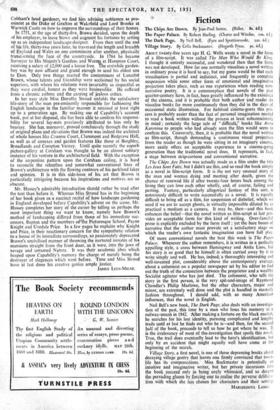Fiction
Mout' twanty-five years ago H. G. Wells wrote a novel in the form of a film-script. It was called The Man Who Would Be King. I thought it entirely successful, and wondered then that the form was not developed. How far one normally visualises a novel written in ordinary prose it is hard to say, but my guess would be that such visualisation is partial and indistinct, and frequently in complete suspension while some other form of emotional and imaginative projection takes place, such as one experiences when reading non- narrative poetry. It is a commonplace that novels of the past quarter-century have, in fact, been greatly influenced by the existence of the -cinema, and it is probable that both author and reader do visualise books far more continuously than they did in the days of occasional static illustration. For habitual cinema-goers this pro- cess is probably easier than the feat of personal imagination needed to read a book written without the process at least subconsciously in mind ; certainly the large sale of "difficult.' books like Anna Karenina to people who had already seen the film would seem to confirm this. Conversely, then, it is probable that the novel written
as film-script, though demanding continuous visual projection from the reader as though he were sitting in an imaginary cinema, more easily offers an acceptable experience to a cinema-going generation than the traditional novel does. It represents, in fact, a stage between strip-cartoon and conventional narrative. -
The Chips Are Down was actually made as a film under the title Les Jeux Sons Faits, but I didn't see this, and so read the book simply as a novel in film-script form. It is .the not very unusual story of the man and woman dying and meeting after death, given the chance of renewed life if after twenty-four hours back among the living they can love each other wholly, and, of course, failing and parting. Fantasy, particularly allegorical fantasy of this sort, is notoriously difficult to write successfully as a novel. It is equally difficult to bring off as a film, for suspension of disbelief, which we need if we are to accept ghosts, is virtually impossible diluted by so practical a medium as a camera. It may be, then—and this book enhances the belief—that the novel written as film-script at last pro- vides an acceptable form for this kind of writing. Over-fanciful prose is explicitly excluded by the form itself ; yet the bare bones of narrative that the author must provide set a satisfactory stage on which the reader's own fantastic imagination can have full play.
Of more conventional novels the best this week is The Paper Palace. Whenever the author remembers, it is written in a perfectly appalling style, a cross between Hemingway and Anita Loos. but his story is so good that he himself -is often carried away by it to write simply and well. He has, indeed(a thoroughly interesting and well-invented pled, considerably above the contemporary average, about a columnist on a popular newspaper set by his editor to find out the truth of the connection between the proprietor and a wealthy Socialist agitator who has just died. The columnist, who tells the story in the first person, is the very spit-and-image of Raymond Chandler's Philip Marlowe, but the other characters, major and minor, are extremely well done and the plot is handled in masterly fashion throughout. I should add, with so many American influences, that the novel is English.
Neil Bell's new book, The Dark Page, also deals with an investiga- tion of the past, this time by a man who loses his memory in a railway-smash in 1942. After making a fortune on the black market, he searches for his lost identity, pursuing complicated and lengthy trails until at last he finds out who he is--and then, for the second half of the book, proceeds to tell us how he got where he was. It is the irrelevancy of most of the.investigation that spoils this novel. True. the trail does eventually lead to the hero's identification, but only by an accident that might equally well have come at the beginning of the search.
Village Story, a first novel, is one of those depressing books about decaying village gentry that leaves one firmly convinced that tcm n- life has its compensations. Miss Buckmaster is potentially an intuitive and imaginative writer, but her private incursions into the book succeed only in being coyly whimsical, and so deepen the pervading gloom by forcing one to_realise the perverse delibci.i- tion .with which she has chosen her characters and their setting.
MARGHANITA LASKI.


































 Previous page
Previous page